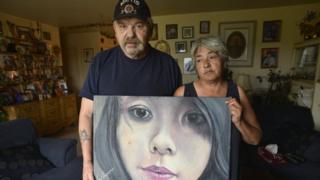Canada's indigenous women inquiry delayed by red tape
Officials from Canada's national inquiry into missing and murdered indigenous women have said government red tape is slowing down the probe.
In an interim report, investigators said they need more time and money before they can present their findings.
Prime Minster Justin Trudeau's government launched the inquiry a year ago to investigate systemic violence against indigenous women and girls.
But it has been dogged by resignations and complaints from victims' families.
Mr Trudeau, who is up for re-election in 2019, made investigating missing and murdered indigenous women a campaign promise. The federal government has given the inquiry two years to come up with its findings.
However, Chief Commissioner Marion Buller said the inquiry must balance the procedural needs of the investigation with the need to help bring victims' families closure.
"We need enough time to do the job properly," she said in a news conference on Wednesday.
Since May the inquiry has heard from about 300 victims and their families from across the country. About 900 have registered to testify.
- Why are girls disappearing all over Canada?
Some families of victims have complained about poor communication and a lack of public information.
The interim report, released on Wednesday, said that government regulations regarding contract procurement and privacy as well as delays in setting up staff offices and hiring were partly to blame.
The inquiry also asked for more funds be allocated to health services for victims, their families and for indigenous grassroots organisations.
The report also recommended that the government create a national police task force to investigate historic and contemporary crimes.
Although the inquiry has yet to hand over new information to police, Ms Buller said they have found evidence of "improper or inadequate policing" and expect some cases may be re-opened as a result of the probe's findings.
"Today, as we speak in this room, indigenous women and girls are suffering violence. That has somehow become normalised and that is a tragedy," Ms Buller said.
More from BBC Magazine
BBC reporter Joanna Jolly went on the trail of the murdered and missing to find out why so many of Winnipeg's Aboriginal women and girls have been killed. Read full article

